It took nine months to build the track and viewing areas for the Miami Grand Prix on the grounds of Hard Rock Stadium.
They've served their purpose, and now that they’re being dismantled — was Formula One a hit in South Florida? It all depends on perspective.
Some local residents are dreading the thought of Formula One racing happening once a year in their neighborhood.
“So we got nine more years of this,” said Deedee Gilliard, who lives just north of the stadium and told me she’ll be leaving town during next year’s race.
Get South Florida local news, weather forecasts and entertainment stories to your inbox. Sign up for NBC South Florida newsletters.
We spoke to Gilliard on Friday, during the practice runs. She said the volume was much greater on Saturday and Sunday when races were happening.
“It was extremely, extremely loud, it was almost unbearable to be outside,” Gilliard said.
So does that mean the Grand Prix was loud enough to cause hearing loss in people outside the racecourse? That was a concern of the group which tried to stop the race in court. Miami-Dade Commissioner Oliver Gilbert, the former mayor of Miami Gardens, doubts it.
“I was there, I live around the stadium, my family, we live around the stadium, we didn’t go deaf,” Gilbert said. “I’m not a big race guy, whether it be Formula One or NASCAR, what I am a big fan of is tourism in Miami-Dade County and how it drives our economy.”
The race drove customers into Lorna’s Caribbean American Grill. On Friday, the manager told us they were expecting a big influx of business from the Grand Prix. I asked if that expectation panned out.
“Yes it did. We were overpacked, overbooked, and we enjoyed everyone who came in for the Formula One. It was exciting all weekend,” said Durell Eskridge, the restaurant’s manager.
“And while it’s a little bit early from our perspective to measure the full impact, especially economic impact, I will tell you that the brand impact is already being felt,” said Rolando Aedo, the chief executive officer of the Greater Miami Convention and Visitors Bureau.
Aedo says the Grand Prix was a grand way to advertise South Florida to a worldwide audience eager to travel now that the pandemic lockdowns are in the rearview mirror.
“So it couldn’t be better not only from the economic impact, the jobs, the resort taxes and the revenue, but also the timing for us to welcome back the international market,” Aedo said.
Formula One seems to have been good for commerce, without question, but perhaps not as good for quality of life in Miami Gardens during that three-day period, with epic traffic congestion and noise.
Gilbert told us he appreciates the concerns of some of his constituents but thinks the positives of the Grand Prix outweigh the negatives.



